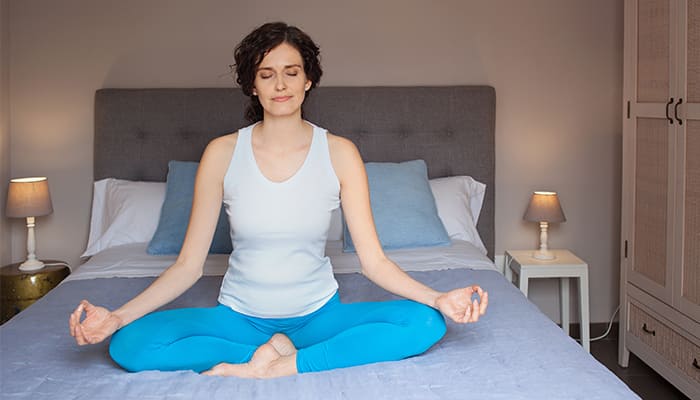
Good Night: The 4 Stages of Sleep
Published: October 2020
If you want to feel well, you need to sleep well. Regular, restful sleep gives your body the time it needs to repair muscles, fortify your immune system and boost your brain.
So what does the term “good night of sleep” actually mean? There are four stages of sleep, and your body needs to experience each of them to rest, recover and prepare for the next day.
Stage 1: Drifting off to bed

You turn out the lights, climb into bed, snuggle up to your pillow, and gradually, you drift from a state of drowsiness to stage 1 sleep. This stage is light and only lasts about five to 10 minutes, during which your breathing and heartbeat begin to slow. It’s easy to wake up during stage 1.
Stage 2: Cycles of light sleep all night long

Like stage 1 sleep, stage 2 is fairly short, lasting only about 20 minutes. As your muscles relax further, your heart rate will dip as well, and your eyes will stop moving. Your body temperature also will drop. You’ll experience stage 2 after stage 1, but you’ll also experience it repeatedly throughout an entire night’s sleep as you move in and out of other stages.
Stage 3: The deep sleep

Stage 3 sleep is the deepest stage, and it is necessary for you to enter this phase to wake up feeling refreshed in the morning. Breathing and heart rate further decelerate to their lowest levels of the night, and people are difficult to awaken during this stage.
Stage 4: Dream on

Once you’ve gone through the first three phases, it’s time for the fourth and final phase: rapid eye movement, or REM sleep. This phase gets its name from the way the eyes move from side to side under the lids, and this is also when most dreaming is thought to occur. In fact, during REM sleep, which happens about an hour and a half after falling asleep, people undergo a temporary paralysis to prevent acting out of the dreams.
Why REM sleep is so important

So you don’t dream…who needs to temporarily believe they’re riding through a grocery store on a bicycle, or being chased by a tiger, anyway? It’s true that nightmares are no fun, but REM sleep is actually important to your health. Lack of REM sleep, which tends to decrease during aging, can lead to health and cognitive problems. Indeed, insufficient REM could impact waking life, since REM sleep has been suggested to be the stage in which information in the brain is consolidated, making it important for memory and learning.
“We are at least as dream deprived as we are sleep deprived,” remarked Dr Rubin Naiman in The Annals of the New York Academy of Sciences. “Many of the health concerns attributed to sleep loss result from a silent epidemic of REM sleep deprivation. REM/dream loss is an unrecognized public health hazard that silently wreaks havoc with our lives, contributing to illness, depression and an erosion of consciousness.”
How to achieve REM sleep

So how do we get the complete night of sleep we need? Turning away from the blue light emitted by electronic devices at least an hour before bedtime is a good way to get on the path to better sleep habits. Avoiding caffeine later in the day is another.
Some people find melatonin or herbal ingredients help them fall asleep faster. Regular exercise and a consistent nighttime routine can also help you get the healthy REM sleep you need.
Don’t take restless nights lying down. Change your sleep habits for the better and dream away.
References
- Ambardekar, Nayana, MD. “What Happens to Your Body When You Sleep?” WebMD, March 2021, https://www.webmd.com/sleep-disorders/what-happens-body-during-sleep
- American Sleep Association. “REM Sleep: Why is it important?” Accessed 10 Oct 2020.
- Howland, Jason. “Mayo Clinic Minute: What are the stages of sleep?” Mayo Clinic, January 2018, https://newsnetwork.mayoclinic.org/discussion/mayo-clinic-minute-what-are-the-stages-of-sleep/
- Mayo Clinic. “REM sleep behavior disorder.” Accessed 10 Oct 2020.
- National Heart, Lung, and Blood Institute. “Sleep Deprivation and Deficiency.”
- National Institute of Neurological Disorders and Stroke. “Brain Basics: Understanding Sleep.” National Institutes of Health, Accessed 13 Aug 2019.
- Naiman R. Ann N Y Acad Sci. 2017 Oct;1406(1):77-85.
- “Stages of Sleep: The Sleep Cycle.” American Sleep Association, https://www.sleepassociation.org/about-sleep/stages-of-sleep/
Like what you read?
Please subscribe to get email updates on this blog.



